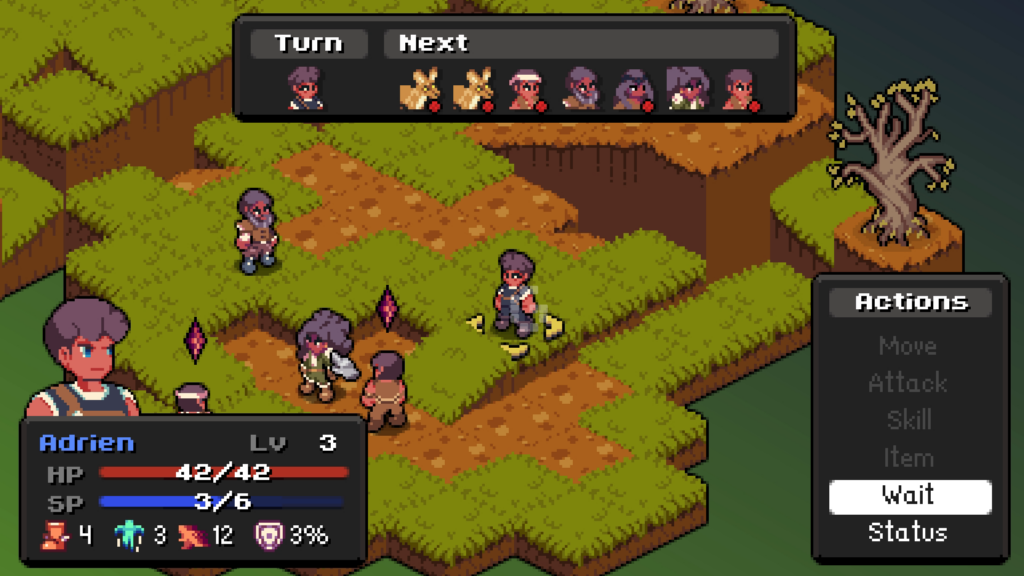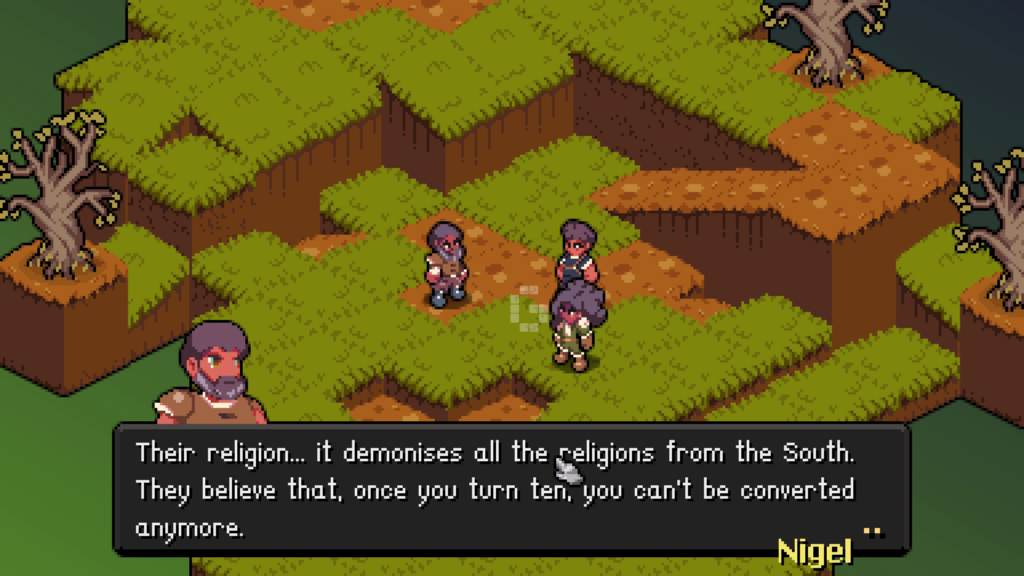The tactics RPG genre is well and alive in Vanaris Tactics- out this week and published by Toge Productions while being developed by solo developer Matheus Reis, this game promises a short and fun experience with a lot of love directed at iconic strategy game Tactics Ogre.
From its gorgeous sprite art to its combat which forces you to use some braincells, it should really be commended just how streamlined Vanaris is- it’s very good at trimming the fat and delivering a solid package- though anyone expecting an indie Final Fantasy Tactics game would do well to temper their expectations.
Combine that with a surprisingly resonant story, and you get a pretty decent game. How so? Read on and find out:
Use Your Brain Cells
As a tactics RPG, Vanaris Tactics is pretty decent- while it takes obvious cues from Final Fantasy Tactics, Vanaris definitely feels like there’s less in the way of how much you can actually do in the game.
Honestly, I don’t mind it too much- I like my tactics RPGs to the simpler side, to which Vanaris excels. Basically just never attack anyone from the side, and then be sure to change the direction your character is facing at the end of your turn to account for your opponent and get a buff to your defense.

I especially like the reduced reliance on RNG in the game- damage is mostly flat, so it never feels like I’m in danger of losing my party to a random crit coming out of nowhere. It’s reduced but not gone entirely though- I’ve had my skin saved and simultaneously lost it to random misses, but they’re practically endemic to the genre at this point.
That’s basically a huge chunk of what I really like about Vanaris Tactics- it’s simple, but not in a way that feels insulting. As someone who’s not particularly familiar with the genre, Vanaris felt very welcoming- no need to trawl through sheets and sheets of menu understanding things, you’re free to pick things up at your own pace.
That being said, considering how blatant the game’s marketing is in its inspiration, I can also empathize with people wanting literally indie Final Fantasy Tactics being disappointed when they hope for something like class customization but don’t get to do it.
Class Maketh Man

While there’s no changeable class system in the game, Vanaris Tactics makes each class feel unique and powerful, especially with the starting set the game gives you. There’s no all-rounder classes- each unit is a valuable specialist, so you’ll want to quickly wrap your head around what works and what doesn’t before you accidentally send your ranger face first into a dragoon.
I’m especially a big fan of your dedicated spellcaster- she cannot hold any weapons, instead being entirely reliant on her kit of spells. In return though, she has the best mobility in the game. Managing her is a huge commitment, since you really don’t want to see her hit. Rather than have each class play similarly with different skills, it’s really cool at the amount of love poured into Vanaris Tactics.
Mastery of these classes is quintessential in Vanaris Tactics, since the game presents some pretty steep difficulty spikes. As much as I enjoyed my casual romps, a lot of marquis moments in the game feel like extreme tests of your understanding of the game’s systems, that really force you to throw the kitchen sink in terms of buffs if you want to keep a poisoned man with a death wish alive.
Story-Focused Approach

One other thing Vanaris Tactics excels at is its story, which is deeply culturally resonant. Without getting into spoilers, the game is very quick and casual to tell you that this is a story whose backdrop is colonization- characters will talk about how they were essentially colonized, lamenting having their freedom taken from them and even losing out their freedom of religion. I think any non-white commonwealth country is sure to appreciate the brevity with which the game sets the stage- it definitely feels like something you almost need that pre-existing module in your brain installed.
It’s decently paced enough- you play as a family out to escape the oppressive kingdom, picking up new members in your resistance as you move from town to town. Admittedly sometimes the game can feel a little too linear- the game’s map is not afraid to lock off previous areas in the name of making you feel more involved with the story.
That’s not to say it’s entirely linear though- you can go back to some areas to do new fights, with some such areas even having secret party members to recruit in them. The beast party members like Arus the dog are especially valuable, but balanced out by not actually being controllable- instead the AI takes the helm with them and you just watch as a single dog takes three turns in a row and defeats colonialism all on his own.

Cling Together For Fun

All in all, I really enjoyed Vanaris Tactics, and that’s despite my own general aversion to the tactics genre. It’s not a super hardcore game a la Triangle Strategy or Final Fantasy Tactics, but it’s a great way to show people like me that tactics games can be fun, regardless.
Admittedly, some more hardcore fans might be upset at the thought of the game being so watered down. But considering the game’s solo development by Matheus Reis, what was accomplished was an amazing feat of resource management. No, there aren’t 50 different classes with mechanics to steal turns, but the fact every character you recruit feels so distinct makes each tactical decision feel even more pivotal.
Couple that with a good dose of “I hate the colonizers” story, and you’ve got a great game for a lazy afternoon.
| Pros | Cons |
| Beautiful spritework | If you're expecting Tactics Ogre, you're probably not going to have a good time |
| Streamlined combat | |
| Arus The God-Dog Of Anti Colonialization rules |

Game reviewed on PC. Review code provided by Toge Productions, the game’s publisher.










![[EXCLUSIVE] Inside Japan’s Indie Game Revolution – An Interview with BitSummit Organizer Masahiko Murakami](https://cdn.gamerbraves.com/2025/05/BitSummit-Orgainzer_Interview_FI-360x180.jpg)
![[EXCLUSIVE] The Art of Adaptation: Developer Interview Details the OVERLORD Mobile RPG Lord of Nazarick](https://cdn.gamerbraves.com/2025/05/Lord-of-Nazarick_Interview_FI-360x180.jpg)
![[EXCLUSIVE] Taking Gundam in Bold New Directions – Interview with GQuuuuuuX Director Kazuya Tsurumaki](https://cdn.gamerbraves.com/2025/04/Kazuya-Tsurumaki_Interview_FI-1-360x180.jpg)


![[SEA Exclusive] From Shadows to Shipwrecks – Jennifer English Talks About Bringing Emotional Depth to Clair Obscur: Expedition 33](https://cdn.gamerbraves.com/2025/04/Clair-Obscur-Jennifer-English_Interview_FI-360x180.jpg)

![[EXCLUSIVE] Do the Game Interview – An Intimate Look at the Challenges of Game Development](https://cdn.gamerbraves.com/2025/04/Do-the-Game_Interview_FI-1-360x180.jpg)
![[EXCLUSIVE] Interview with the Minds Behind of Den of Wolves – 10 Chambers’ New Sci-Fi Heist FPS](https://cdn.gamerbraves.com/2025/04/Den-of-Wolves_Interview_FI-360x180.jpg)










![[GUIDE] SD Gundam G Generation Eternal Unit Tier List](https://cdn.gamerbraves.com/2025/04/SD-Gundam-G-Generation-Eternal-Tier-List_Review_FI-360x180.jpg)